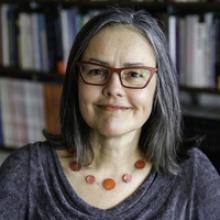What Is It
Philosophy is the love of wisdom – or is it? Is this traditional definition outmoded? Is wisdom an anachronism, an elitist concept deployed by old learned people with nothing of practical value to say? Do the professors of philosophy around the world (or on this program) love wisdom any more or less than anyone else? John and Ken wise up with Valerie Tiberius from the University of Minnesota, author of The Reflective Life: Living Wisely With Our Limits.
Listening Notes
In Plato’s Apology, perhaps the most famous philosopher of them all—Socrates—concludes that his wisdom lies in the fact that he knows nothing. Discussing the parable, John insists that there must be more to wisdom than humility. It turns out that another famous Greek philosopher, Aristotle, agreed. John and Ken turn to University of Minnesota Professor Valerie Tiberius to illuminate how the ancient debate about wisdom continues to this day.
Valerie reveals that her academic fascination with wisdom came from a search for answers to the big questions she was facing in her own life. Valerie gives a working definition of practical wisdom: “the virtue that governs decisions about how to live your life.” But is anyone who knows what they value and decides to act on it wise? What about hedonists? Valerie seeks to defend the claim that at a deep level, almost all people really value friendship, achievement, contentment and meaning above the so-called “baser” pleasures.
So what is the content of wisdom? How does one attain it? Valerie claims that wisdom is many things. It is in part knowledge of oneself and what will make you happy. But it is also about the habits we cultivate. Valerie agrees with one caller that wisdom consists largely of knowing when to shift perspectives from the forest to the trees, from reflecting on what’s worthwhile and good to enjoying the moment.
The conversation next turns to questions about wisdom in the modern age. Ken argues that our wisdom has lagged dangerously behind our staggering increases in scientific and technical knowledge. Valerie wonders whether the increasing information available about other belief systems today makes one wiser or just more confused. And finally, everyone weighs in on so called “revealed-wisdom”: Is hearing the words of God a symptom of insanity or really the same phenomenon as listening to one’s intuition?
In the end, perhaps we come away from the show with more questions than any concrete knowledge about what wisdom is and how to attain it. Socrates would be happy.
- Roving Philosophical Report (seek to 04:35): Caitlin Esch seeks advice from her elders at AgeSong at Lake Merritt, an independent living community for seniors. Their advice varies, but certain ideas crop up again and again: Independence. Experience. Following your passions. And as Caitlin’s own grandmother told her: “It’s as easy to love a rich man as it is to love a poor one.”
- 60-Second Philosopher (seek to 48:47): Ian Shoales details and debunks the so-called wisdom of sages past, from the three wise monkeys to the three wise men.
